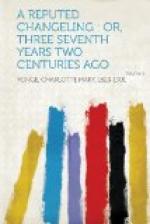“My father and Mr. Horncastle pray,” said Peregrine bitterly. “I hate it! They go on for ever, past all bearing; I must do something—stand on my head, pluck some one’s stool away, or tickle Robin with a straw, if I am birched the next moment. That’s the goblin.”
“Yet you love the Minster music.”
“Ay! Father calls it rank Popery. I listened many a time he never guessed, hid away in the Holy Hole, or within old Bishop Wykeham’s little house.”
“Ah, Peregrine, could an imp of evil brook to lie hidden in the Holy Hole behind the very altar?” said Mrs. Woodford. “But I hear Nick bringing in supper, and I must leave you for the present. God in His mercy bless you, His poor child, and lead you in His ways.”
As she went Peregrine muttered, “Is that a prayer? It is not like father’s.”
She was anxious to consult her brother-in-law on the strange mood of her patient. She found that he had heard more than he had told her of what Major Oakshott deemed the hopeless wickedness of his son, the antics at prayers, the hatred of everything good, the spiteful tricks that were the family torment. No doubt much was due to the boy’s entire belief in his own elfship, and these two good people seriously considered how to save him from himself.
“If we could only keep him here,” said Mrs. Woodford, “I think we might bring him to have some faith and love in God and man.”
“You could, dear sister,” said the Doctor, smiling affectionately; “but Major Oakshott would never leave his son in our house. He abhors our principles too much, and besides, it is too near home. All the servants have heard rumours of this cruel fable, and would ascribe the least misadventure to his goblin origin. I must ride over to Oakwood and endeavour to induce his father to remove him to safe and judicious keeping.”
Some days, however, elapsed before Dr. Woodford could do this, and in the meantime the good lady did her best to infuse into her poor young guest the sense that he had a human soul, responsible for his actions, and with hope set before him, and that he was not a mere frolicsome and malicious sprite, the creature of unreasoning impulse.
It was a matter only to be attempted by gentle hints, for though reared in a strictly religious household, Peregrine’s ears seemed to have been absolutely closed, partly by nursery ideas of his own exclusion from the pale of humanity, partly by the harsh treatment that he was continually bringing on himself. Preachings and prayers to him only meant a time of intolerable restraint, usually ending in disgrace and punishment; Scripture and the Westminster Catechism contained a collection of tasks more tedious and irksome than the Latin and Greek Grammar; Sunday was his worst day of the week, and these repugnances, as he had been taught to believe, were so many proofs that he was a being beyond the power of grace.




